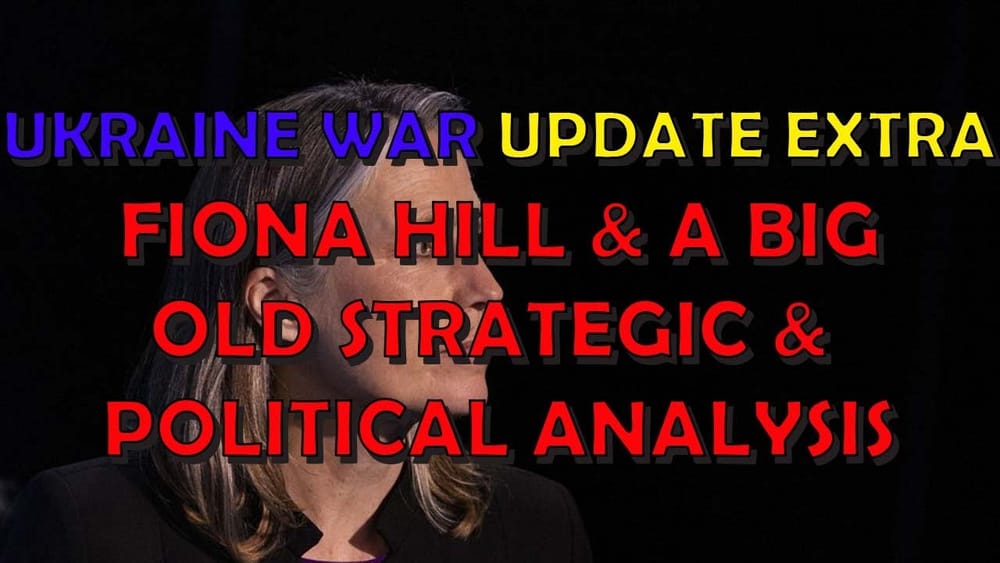Ukraine War Upd. EXTRA: Fiona Hill's and My Big Old Strategic & Political Analysis
Table of Contents 📖
"Ukraine has become a battlefield now for America and America's own future whether we see it or not for our own defensive posture and preparedness for our reputation and our leadership."
Hello Team
🎦 00:00-01:49⏩
Jonathan welcomes viewers to an "extra nuggets and tidbits" Ukraine War Update where he will mainly be discussing a Politico interview with Fiona Hill, former White House advisor. He notes the interview is lengthy, touches on US politics and may be divisive due to Hill's role in Trump's impeachment.
Return to top⤴️
Fiona Hill on Defining Victory in Ukraine
🎦 01:49-04:34⏩
Jonathan begins by reading Hill's response to the question of who is winning the war in Ukraine. Hill argues that despite narratives surrounding the counteroffensive, Ukraine has already secured a victory by fighting Russia to a standstill and securing its independence. Hill emphasises the importance of external support, particularly from the US, in determining Ukraine's ability to continue resisting Russia. She highlights concerns over political discourse in various countries including the US, Hungary, and Slovakia, that could jeopardise support for Ukraine, contrasting these with positive signals from Germany, France, the UK, and Baltic and Nordic states.
Return to top⤴️
Domestic vs. International Politics & the Impact on Ukraine
🎦 04:34-07:13⏩
Jonathan continues reading Hill's analysis, focusing on how Ukraine has become a domestic political issue in many countries. Hill argues that this politicisation, particularly in the US, creates a "transactional" approach to aid for Ukraine, where domestic concerns, such as border security in the US, are prioritised over national and international security. Hill contends that this short-sightedness stems from a limited understanding of global interconnectedness among many constituents and politicians.
Return to top⤴️
Putin's Perspective: US Political Debates and Global Opportunities
🎦 07:13-09:50⏩
Shifting to Putin's perspective, Jonathan reads Hill's view that Putin sees the US political debate, particularly regarding aid for Ukraine, as beneficial to his agenda. Hill argues Putin interprets this as a sign of US unreliability and declining global leadership, which emboldens him and his allies. Jonathan and Hill highlight Putin's recent diplomatic engagements in the Middle East as evidence of this growing confidence. Hill suggests that Putin sees parallels in the US debate and the dynamics of the Israel-Palestine conflict, potentially offering him further opportunities to undermine US influence.
Return to top⤴️
A Loss for Ukraine: Emboldening Authoritarianism and Nuclear Proliferation
🎦 09:50-14:16⏩
Jonathan and Hill discuss the implications of a Russian victory for other countries, positing that it would be seen as a win for Iran, North Korea, and China, and could further empower these actors on the world stage. This empowerment would not only impact regional power dynamics but also potentially embolden these states to pursue more aggressive policies, such as China towards Taiwan. They argue that a Russian victory would have global consequences, particularly regarding nuclear proliferation. Countries with nuclear ambitions might feel emboldened to pursue these ambitions, viewing the lack of consequences for Russia's actions as a green light.
Return to top⤴️
Lessons from the Battlefield
🎦 14:16-15:06⏩
Jonathan expands on Hill's point about countries learning from the conflict. He shares his worry about Russia's increasing military production capacity despite sanctions, suggesting Russia has found ways to circumvent restrictions and import necessary electronic components. He plans to elaborate on this in a future video.
Return to top⤴️
Putin's Definition of Victory and US Partisanship
🎦 15:06-17:12⏩
Jonathan reads Hill's response to how Putin might define victory. Hill posits that Putin's success hinges on the US Congress failing to pass the $106 billion aid package for Ukraine. This failure, she argues, would allow Putin to frame the US as an unreliable ally and further erode trust in US leadership globally. Hill believes this would embolden Putin to pursue a partition of Ukraine along the current ceasefire lines, a scenario she argues would be presented as a win for Putin, especially within the context of the ongoing debate surrounding negotiations.
Return to top⤴️
The Perils of Premature Negotiations and the Budapest Memorandum
🎦 17:12-19:25⏩
Jonathan and Hill caution against premature negotiations with Russia, asserting that negotiating from a position of weakness only benefits Putin. Jonathan believes Russia needs to be "severely on the back foot" before any meaningful negotiations can occur and this will only happen if Ukraine receives the necessary support to turn the tide of the war. They discuss the Budapest Memorandum and the West's failure to uphold its security guarantees to Ukraine, highlighting both the moral and security implications of this failure.
Return to top⤴️
Putin's Re-election Bid and the Russification of Occupied Territories
🎦 19:25-20:45⏩
Jonathan reads Hill's assessment of how the Ukraine war plays into Putin's re-election bid. Hill believes that a win in Ukraine is crucial for Putin, particularly in light of his domestic audience. They discuss the ongoing "Russification" of occupied territories, including forced deportations and the imposition of Russian citizenship on Ukrainian residents. Hill argues that a partition would be a significant propaganda victory for Putin, allowing him to solidify his domestic standing and further his expansionist ambitions.
Return to top⤴️
Ukraine as a Proxy War and the Erosion of US Global Standing
🎦 20:45-23:43⏩
Jonathan continues reading Hill's analysis, focusing on the potential long-term consequences of a negotiated settlement that cedes Ukrainian territory to Russia. They highlight the risk of Russia continuing its propaganda and influence operations within a partitioned Ukraine, potentially leading to further conflict. Jonathan draws parallels with the period following Russia's annexation of Crimea in 2014. Hill warns of the dangers of a "rinse and repeat" scenario where concessions embolden Putin to pursue further aggression. Both agree that this outcome would severely damage US credibility on the world stage, making it harder for the US to uphold its commitments to allies and deter future aggression.
Return to top⤴️
The Moral Imperative and Nuclear Proliferation
🎦 23:43-24:30⏩
Jonathan and Hill discuss the moral implications of the West's failure to uphold its security guarantees to Ukraine, given Ukraine's decision to relinquish its nuclear weapons in the 1990s under the Budapest Memorandum. Hill believes that a Russian victory could fuel a new era of nuclear proliferation as countries might conclude that possessing nuclear weapons is the only reliable deterrent.
Return to top⤴️
Addressing Concerns about US Spending on Ukraine
🎦 24:30-26:48⏩
Jonathan addresses the argument that US funding for Ukraine would be better spent domestically. He reads Hill's counter-argument, which emphasizes that the majority of the military aid to Ukraine involves US-manufactured weapons, thus benefiting the US economy through job creation and defence industry support. Hill argues that the "transactional" nature of US politics leads to using Ukraine aid as leverage for unrelated domestic agendas, driven by a desire to secure votes rather than addressing the larger geopolitical context.
Return to top⤴️
Ukraine: A Partisan Issue?
🎦 26:48-28:10⏩
Jonathan highlights Hill's assertion that the upcoming US presidential election is the main driver behind the reluctance to provide aid to Ukraine among some lawmakers. He suggests that aiding Ukraine has become intertwined with supporting Biden, leading some Republicans to prioritise undermining Biden over the implications of a Ukrainian defeat. Hill argues that many lawmakers prioritise domestic political calculations over national security and foreign policy concerns.
Return to top⤴️
Andrew Perpetua's Perspective: Abortion, the Border, and the 2024 Election
🎦 28:10-38:01⏩
Jonathan shifts to address a comment from viewer Andrew Perpetua, who argues that the Republican stance on Ukraine is not solely about undermining Biden but also reflects a deeper concern about the upcoming election. Perpetua suggests that Republicans are struggling to develop a winning strategy, particularly after successive electoral defeats on the issue of abortion. Jonathan agrees with Perpetua's analysis, noting the significant backlash Republicans have faced since the overturning of Roe v Wade, particularly among women voters, and acknowledges this as a major electoral liability going into the 2024 election.
Return to top⤴️
Texas Abortion Case
🎦 38:01-40:43⏩
Jonathan digresses to elaborate on a recent case in Texas involving a woman seeking an abortion due to fetal abnormalities. He sees this case as further evidence of the political risks for Republicans on the issue of abortion. He argues that the case, which saw a woman initially granted and then denied an abortion despite significant health risks, will further galvanise pro-choice voters.
Return to top⤴️
Republican Strategy Shift: From Abortion to the Border?
🎦 40:43-43:20⏩
Returning to Perpetua's argument, Jonathan agrees with the assessment that Republicans are trying to shift the political conversation away from abortion towards other issues, particularly border security, as a way to mobilise their base and regain electoral momentum.
Return to top⤴️
A Potential Democratic Strategy: Neutralising the Border Issue?
🎦 43:20-45:12⏩
Jonathan contemplates a potential Democratic strategy of defusing the border issue by agreeing to some Republican demands, thereby removing a key campaign issue for the Republicans. He speculates that this could allow the Democrats to focus on other issues where they have more public support, such as abortion rights and potentially even achieve a decisive victory in Ukraine by then releasing significant military aid closer to the election.
Return to top⤴️
Emotional vs. Rational Campaigning: Republicans, Democrats, and the UK Example
🎦 45:12-47:21⏩
Jonathan contrasts Republican and Democratic campaigning styles, suggesting that Republicans tend to be more effective at connecting with voters emotionally by focusing on a few simple, often divisive issues. He argues that Democrats, while often having more detailed and rational policy platforms, struggle to communicate these effectively and connect with voters on an emotional level. He draws parallels with recent UK elections, citing Boris Johnson's success with simple messaging like "Get Brexit Done."
Return to top⤴️
Wrap Up
🎦 47:21-None
Jonathan concludes by acknowledging the lengthy and potentially contentious nature of the discussion, inviting viewer feedback and emphasizing his interest in exploring the geopolitical dynamics of the issues at hand. He signs off and thanks his viewers.
Return to top⤴️



